Reply To:
Name - Reply Comment

By Nishel Fernando
|
K.J. Weerasinghe |
Sri Lanka and India plan to resume negotiations on the stalled Economic and Technological Cooperation Agreement (ETCA) towards the end of October, a top official said.
The Chief FTA Negotiators of Sri Lanka and India held a virtual meeting on the19th of this month to discuss the resumption of ETCA negotiations, according to the President’s Media Division.
“The dates are yet to be finalised. We hope to resume the negotiations towards end of next month, most probably after 20th of next month,” Sri Lanka’s International Trade Office Chief Negotiator K.J. Weerasinghe told Mirror Business.
The two countries have held 11 rounds of bilateral talks from 2016 to 2019 with the aim of broadening and deepening the existing India-Sri Lanka Free Trade Agreement (ISFTA). However, these negotiations have been at a standstill for the past four years due to change in governments and other political developments.
Trade unions and various professional groups also vehemently opposed the opening up of the services sector under ETCA.
During President Ranil Wickremesinghe’s recent visit to India, both countries agreed to restart negotiations to finalise the proposed ETCA agreement, following a four-year hiatus.
In addition to expanding into services and FDIs, Sri Lanka’s FTA negotiators also aim to address some pending concerns over the implementation of the existing ISFTA including easing of quotas on Sri Lankan exports to India in particular focusing on “asymmetry” in trade at the upcoming ETCA talks.
Weerasinghe noted that the country would seek to increase the current duty-free access granted to Sri Lanka’s apparel exporters to a minimum value of US$ 250 million per annum at the upcoming negotiations.
In 2022, India remained as Sri Lanka’s largest bilateral trade partner. The bilateral trade between the two nations surged beyond US$ 5.5 billion in 2022.
Sri Lanka’s IT and BPM industry has been experiencing remarkable growth, offering employment opportunities to over 144,000 professionals. This sector plays a unique role in the Sri Lankan economy, making a substantial contribution to the country’s GDP.
In 2022, the industry generated approximately US$ 1.7 billion. However, the government has set ambitious plans to increase this figure to an impressive US$ 5 billion. To achieve this goal and align with global trends in digitisation, automation, and artificial intelligence, the emphasis is on prioritising skill development.
The vision includes expanding the workforce in this sector to 200,000 individuals by creating fresh employment opportunities for the youth. Such growth is expected to contribute 15 percent to the country’s GDP, positioning Sri Lanka at the forefront of the economic landscape and fostering a more prosperous nation.